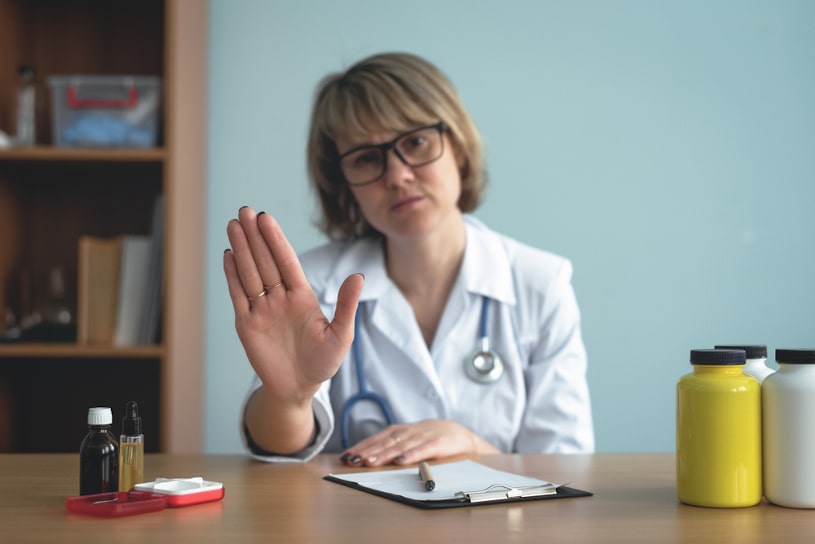Zoloft stands out as the most prescribed type of antidepressant in the U.S in the year 2011. The goal of this medicine is to improve mood, restore one’s appetite, improve sleep, and regulate the level of stress. Since its approval in the U.S as a treatment regimen for anxiety, depression, Obsessive-Compulsive Disorder, Post-Traumatic Stress Disorder, and other mental conditions in 1991, the use of the medication has significantly increased to date.
Table Of Contents:
- What is Zoloft?
- What Are Zoloft Dosage Forms and Strengths?
- What Are Uses for Zoloft?
- Can it Cause Abuse and Addiction?
- What Are The Signs of Abuse?
- What Are Zoloft Risk Groups?
- What Substances to Avoid During the Treatment?
- Is it Easy to Wean Off Zoloft?
- How to Stop Taking This Drug Safely?
- Why is Withdrawal Dangerous?
- What is Sertraline Withdrawal Timeline?
- Can Any Zoloft Withdrawal Remedies Come in Handy?
- Finding Zoloft Addiction Treatment

It was 14h most widely prescribed medication with over 38 million sertraline prescriptions in the U.S. in 2017.
Sertraline is often recommended as a long-term medication as there is no inherent risk in using the medicine for as long as required. However, the mind-altering characteristic of the drug makes it liable to cause dependency.
There is often a debate on the prospect of Zoloft dependency since there is little or no evidence that users ever develop a craving for the drug; however, people who suddenly stop using the medication may start to experience withdrawal symptoms. If one uses sertraline longer than prescribed or off a prescription, one may find that they cannot get through the day generally without using sertraline; this means they have probably developed a dependency.
What is Zoloft?
Zoloft is a popular brand name for sertraline medication made by the American company Pfizer, Inc. It is a prescribed antidepressant medication. It belongs to the group of drugs classified as Serotonin Reuptake Inhibitors (SSRIs).
The efficacy of sertraline in the treatment of mood disorders is due to its ability to regulate brain chemicals such as serotonin, which is mainly imbalanced in individuals suffering from depression, anxiety, and other mental disorders. The prevention of serotonin reuptake by nerves causes an increase in serotonin levels within the synapse in nerves.
Sertraline medication has overtime been researched to understand its mechanism of action and possible reactions in the human body, and there are a few facts that people may be unaware of.
Here Are Some Things That May Be Unknown About the Drug:
- Sertraline also goes by the brand name Lustral which is seldom used.
- When sertraline is used, it takes up to 4-6 weeks to work in the body; this reaction varies from one individual to the other.
- Typical adverse reactions with Zoloft are headache and nausea, which goes away in a few weeks without any necessary action.
- When physicians want to take their patients off sertraline, they usually taper off the medication by continually reducing the dosages administered to ensure that they do not develop an addiction to the medication.
- The FDA warns that sertraline is not approved for pediatric patients except for those with obsessive-compulsive disorder (OCD). This is because of the significant risks of suicidal thoughts and behaviors in young adults.
According to research, concomitant use of Sertraline drug with other serotonergic medications such as tricyclic antidepressants or with MAOIs can lead to serotonin syndrome, characterized by high levels of serotonin in the brain.
Zoloft Dosage Forms and Strengths
Zoloft doses come in three different forms, each one with a unique physical feature that separates it from the others. Strength is available in 25mg, 50mg, and a 100 mg pill. The 100mg capsule contains the highest dose available in a single pill. This medication is also available in 20mg/ml solution.
The Table Below Summarizes the Features of Each One:
| Zoloft Dosage Form | Description |
|---|---|
| 25mg |
|
| 50mg |
|
| 100mg |
|
What is the Recommended Zoloft Max Dose?
Adults and children are not recommended to take this medicine at amounts exceeding more than 200mg/day.
Considering that the elimination half-life of Zoloft is 24 hours, any incremental increase in dosage must not be lower than 1 week.
What is the Lethal Dose of Zoloft?
The LD-50 is 2000 mg of the medicine per kg of body weight. It is essential to use this drug only as prescribed by a qualified medical personnel. Don’t mix sertraline with alcohol, medical marijuana or any other substance.
If there’s ever a thought to use more than what is prescribed, immediately seek professional help at rehab or addiction centers. If patients experience symptoms of drug addiction, stopping sertraline medication must only be done under the supervision of a medical professional to avoid withdrawals.
Zoloft Uses
Most times, it is prescribed by professional and qualified doctors to treat a handful of conditions.
These conditions include:
- Major depressive disorder
- Panic disorder
- Social anxiety disorder
- Post-traumatic disorder
- Obsessive-compulsive disorder
- Premenstrual dysphoric disorder
Sertraline is also used for other health issues. Sometimes, sertraline is integrated into the treatment of drug abuse. Mental illnesses are sometimes found alongside substance abuse, and the use of Sertraline generic substances is quite common in these programs.
Zoloft Addiction and Abuse
Zoloft is considered as a safe long-term antidepressant. It is not tagged as an addictive substance or a narcotic. Most psychiatrists recommend the medication because it’s potential for abuse is very low. As much as doctors recommend taking antidepressants for 6 months to a year for depression, sertraline is considered safe to take for even years. The only aspect to consider is its mind-altering capacity. It is unadvised to stop the medication abruptly as it may result in a discontinuation syndrome. The drug is best weaned off over time.
Zoloft addiction is not a craving for the medication, but rather a dependency on the drug due to abuse over a long period of time. The effects may vary from one person to the other.
Why is Zoloft Addictive?
Sertraline is abused for a few specific reasons. Reports show that most abusers use the drug for its pharmacological properties, including sedation, stimulation, and anxiolytic effects. These properties make the drug prone to abuse.
Sertraline, due to its short half-life, leaves the bloodstream and, subsequently, the body, in a short period of time. Physicians advise against stopping the medication without consultation. If a user stops taking the medication abruptly, serotonin levels in the brain will decline very fast, causing the person to go back to their original state.
Scientists have advised although the user may never develop a craving for the substance, they may experience rebound depression, anxiety, and other symptoms as a result of dependency, especially for those who have used the medication for a very long period of time.
Physical and Psychological Signs of Zoloft Abuse
Zoloft abuse can be complicated to detect; this is because its effects are not as pronounced as scheduled drugs and some medications that are regarded as narcotics. There are, however, very subtle physical and psychological signs that one can pick up as related to abuse. Physical addiction to sertraline is unlikely and uncommon; however a psychological addiction may be possible.
Some Physical Signs of Abuse May Include:
- Decreased libido
- Irritability
- Insomnia
- Numbness
- Nausea
- Violence
- Aggression
Behavioral Signs of Zoloft Addiction May Include the Following:
| Symptom | Description |
|---|---|
| Doctor shopping | Addicted people who are abusing sertraline will often seek out several doctors in other cities or counties to get prescriptions for it so that they can have ample storage of the medication. |
| Dishonesty | Due to the pressing need to secure the drug, the user may fake certain symptoms to get a Zoloft prescription or even take someone else’s prescription. |
| Mood Changes | Some individuals may find it challenging to get in their usual mood or unable to function as normal without taking the drug. |
| Quick Fix | A person with a dependency on sertraline may use the drug as a quick fix when they feel like they need to be at their best. |
| Unusual Frequent usage | Using larger dosages than prescribed or taking the medication frequently are clear signs of abuse. |
Zoloft Risk Groups
The FDA made mention of risk groups that are not suited to use sertraline. The reason for this exemption is that the drug can be unpredictable when used for individuals in certain categories and may cause health complications. These risk groups include:
Children and Teens
A “BlackBox” warning was issued against the use of Zoloft in treating children and young adults as the medication was noticed overtime to provoke suicidal thoughts and behaviors in people under this category. Therefore the medication is not approved for the treatment of depression in children aged 6 to 17, except for those with obsessive-compulsive disorder. The risk of Zoloft overdose is also higher in this group.
Senior Patients
The elderly are not particularly suited to this medication. Effective management is required to avoid brittle bones.
Pregnant Women
Taking Zoloft while pregnant is high risk because of the possibilities of neonatal withdrawal and hypertension in the mother. Those who intend getting pregnant and also breastfeeding mothers are advised to refrain from using the medication.
Individuals with Specific Health Conditions
This category of risk groups is based on individuals with underlying health problems that may lead to complications when the drug is used.
These groups include people with the health conditions:
- Heart Problem. Those who have underlying heart problems are unfit to use sertraline as the medication may speed up the heart rate, causing major health issues.
- Allergy Experience. Those who have previously had an allergic reaction to Zoloft are usually advised to avoid the medications for health reasons.
- Glaucoma. Persons with eye defects such as glaucoma are usually advised not to use sertraline; this is because the medication causes increased pressure in the eyes.
- Diabetes. The use of this drug by a person with diabetes is critical as the drug can distort blood sugar levels. It is necessary to monitor one’s blood sugar level while using this medication and adjust treatment when necessary.
Dangerous Zoloft Substance Interactions
It is necessary to discuss mixing and concomitant use of sertraline and another substance with a medical doctor in order to be absolutely sure of its safety. There are medications that may affect the functionality of sertraline or increase their abuse potential. Some unpleasant mixtures are:
- Zoloft and cannabis – the mixture can increase drowsiness and cause unforeseen health issues. The increased level of drowsiness may appeal to abusers; however, this can increase abuse potential.
- Alcohol and Zoloft – the mixture of both substances certainly has an effect on the central nervous system and would increase the typical side effects felt by either of the substances. The adverse reactions may include drowsiness, lack of concentration, dizziness, and the potential to misuse the medication.
Other Risky Substances to Use Together
Using sertraline with other medications such as stimulants, hallucinogens, and psychoactive substances that equally have mind-altering effects on a larger scale can cause a ripple effect, which may cause the individual to abuse sertraline more often with other narcotics such as cocaine, ecstasy.
The full effect of sertraline with various recreational drugs is inconclusive as there are many more trials to be conducted.
Stopping Zoloft
There are various reasons people tend to quit Zoloft, but the most common out there is because of the side effects. Sertraline can increase the weight or cause loss of sexual interest, which can be covered by pharmaceutical companies from the public eyes. These can come in a variety of schemes like suppression of data than using it to lobby the legalization of long-term prescribing, not considering the adverse reactions.
Antidepressants like Zoloft are originally considered to be a short-term treatment for certain mood conditions (about three to six months), but recently, it has hooked millions of people who made use of these drugs for years and can’t find a way to get off it.
This is not limited to America only, but the study in New Zealand has found out that when taking a decision to taper off antidepressants by long-term users, the withdrawal is always the most compliant part of therapy.
Other reasons for people to stop taking Zoloft may include the high cost of the medicine, fear of liver damage, but doctors have disproved this, saying the risk of getting this damage is very low. Other than that, most people are concerned about becoming dependent on sertraline to function in their daily life.
Don’t Stop Zoloft Cold Turkey
Quitting Zoloft cold turkey is not advisable and extremely dangerous because of the way the nervous system adapts to the drug. Abrupt stopping the use of Zoloft can lead to several withdrawals. In some cases, these problems can include heart diseases, seizures and more.
Possible Effects of Sertraline Discontinuation
Sertraline is very well known for having a discontinuation syndrome when the dosage is suddenly stopped or quickly accustomed to. Because this substance leaves the bloodstream so quickly, stopping its dosage rapidly can cause discontinuation syndrome to kick in.
Signs of Having a Discontinuation Syndrome
Discontinuation syndrome may affect everyone who is tapering off Zoloft, but it is likely to occur in people who have been taking the medication for many months or years. The symptoms can instigate the same type of signs a person had, which made them start taking Zoloft pills that particular prescription is in the first place.
These symptoms of discontinuation syndrome may include:
- Anxiety
- Dizziness
- Dysphoric mood
- Irritability
- Agitation
- Sensory disturbances
- Confusion
- Headache
- Insomnia
- Emotional lability
- Hypomania
- lethargy
How Long Does It Last?
Harvard Health Publishing says that discontinuation syndrome tends to show up in the first few days or a week after stopping medication or minimizing dosage, whereas these symptoms stop suddenly when a dose of Zoloft is taken. Most times, symptoms last from a few weeks from the time it shows up to about a month, but if it stays longer than a month and it is not getting any better, it may be possible for a patient to experience depression, and the chances of tapering off Sertraline could get thinner.
How to Stop Taking Zoloft Correctly?
If a patient is thinking about getting off Zoloft, it is recommended to contact their doctor FIRST before any particular steps are taken to undergo their rehabilitation process. With that said, let’s look at ways to stop taking sertraline:
Keep Doctor In the Loop
The study about long-term antidepressant use tells that 45% of patients feel themselves addicted to some extent to the antidepressant. There might also be a fear of experiencing side effects in some patients when stopping Zoloft. This is where doctors play their part. Only doctors should help people taper off to manage Zoloft side effects as well as advice when to take the prescription. Doctors could also change a patient’s dosage to suit their conditions or help them switch their medications too.
Take Meds as Prescribed
When tapering off Zoloft, it is crucial to stick to the prescription even when the patient starts feeling better. Still it is advisable to stay on meds for at least a month or as long as the doctor says. This minimizes the chances of both relapse and discontinuation syndrome when getting off Zoloft.
Dose Reduction
It depends solely on how long the person has been taking the antidepressant, the signs they had, and their current dose. Although reducing their prescription can be hard, the patient might also consider tapering longer intervals between each dose. Signs of discontinuation symptoms might be seen when starting out their dose reduction and when this is noticed, adding back half of their dose or even resetting back to their current medication is the best option at that moment.
Zoloft Withdrawal
When a patient suddenly stops using a drug such as sertraline, the antidepressant withdrawal will come into play. This is especially valid in situations where the patient has been taking the medicine for at least six weeks.
What Factors Influence Zoloft Withdrawal Symptoms?
Regarding Zoloft withdrawal signs, there are no rules that suggest that every patient will exhibit the same symptoms. When people try weaning off Sertraline, some will have a tougher time of it than others.
| Factor | Description |
|---|---|
| Maximum dosage and frequency | The average daily sertraline dosage used by most people falls within 50 mg-200 mg. Theoretically, a patient that was taking a smaller dose each day would find it easier to stop using the drug than someone that was taking the maximum recommended dose regularly. Consequently, sertraline withdrawal symptoms in the former would naturally be less severe than with the latter. |
| History of drug use | As is with the case with most drugs that exhibit withdrawal symptoms, the longer it has been, the harder it gets. However, there are bound to be exceptions. Withdrawal from Zoloft would be easier for a patient that has only been taking the drugs for a few weeks compared to another that has been on it for years. In the case of the latter, the adverse effects of Zoloft will be stronger than with the former. According to a study published on NCBI, SSRI withdrawal symptoms can appear up to 90 weeks. |
| Detox technique | The best detox approach to withdrawal from antidepressants is to do it slowly. It is not advised to go cold turkey as this may harm the body system instead of repair it. Zoloft withdrawal is no exception to this rule. |
| Physiology of user | The physiological nature of the patient also plays a part in perceived recovery timelines. Some people naturally exhibit a level of resistance to withdrawal symptoms from drugs, and they may not even experience any sertraline withdrawal effects. On the flip side, the physiological nature of some other people ensures that they react extraordinarily to withdrawal from these types of drugs. |
Sertraline Withdrawal Symptoms
There are varying possible symptoms that may be exhibited by a patient after they stop using sertraline. A single patient will only show some of these symptoms, and a good number of them are associated with SSRIs generally.
With That Said, Here’s a Comprehensive Zoloft Withdrawal Symptoms List:
- Change in appetite
- Problems with sleeping
- Getting suicidal thoughts
- Lapses in memory
- Panic attacks
- Irritation
- Insomnia
- Headaches
- Depression
- Having issues with concentrating
- Brain zaps
- Anxiety
- Anger
- Odd dreams
- Crying spells
- Erectile dysfunction
- Extra-sensitivity
- Sweating at night
- Sudden hot flashes through the body
- Exhibiting flu-like symptoms
- Fatigue
- Body cramps
- Muscular pain
- Restlessness
- Confusion
- Vertigo
- Mood swings
- Weakness
Zoloft Withdrawal Timeline
Just like the severity of the symptoms, the Zoloft withdrawal timeline varies from person to person. For some people, the symptoms are not exhibited until a few weeks after the last dose of the drug was taken. For other people, they have gone through the symptoms and overcome them within the same period.
Here Is the Usual Timeline of the Entire Withdrawal Process:
Day 1-3: the first few withdrawal symptoms show up. For users that are tapering off gradually, the early signs are usually mild.Day 4-5: the symptoms increase in number or intensity. Symptoms such as vertigo, nausea, and fever may be included. Naturally, patients that have been ingesting higher doses of the anti-depressants will have the most intense reactions at this stage.
Day 6-21: during this period, the symptoms usually hit their peak and begin the gradual process of subsiding. Most antidepressant drugs have a withdrawal timeline that cycles through within three weeks, and Zoloft is no exception.
Day 22 and above: depending on other factors, some patients may experience a longer withdrawal timeline than is the norm.
Zoloft Withdrawal Remedies
The advantage of using Zoloft is that it can be used for long-term treatment and is relatively safe; however, if one begins to notice signs of abuse or symptoms of withdrawal, the appropriate thing to do is to discuss these health issues with a medical doctor, who would likely recommend a tapering schedule to wean the user off the drug.
The weaning process may take weeks to months, depending on how long the person has been using sertraline. Weaning off sertraline is important because it ensures that there are no symptoms or adverse reactions to coming off the medicine.
Some specific supplements are well-known for their effectiveness in reducing the unpleasant effects of withdrawal. These are not just random multivitamins, so it is essential to know which sertraline alternatives to purchase. First of all, there are a few important things to note before purchasing supplements.
How and When to Use Supplements?
The patient needs to discuss with their doctor if the sertraline detox process is complete or still in progress. If it is complete, then it is okay to use supplements. However, patients that are still tapering off are advised to resist the urge to use supplements because they may interfere with the antidepressant drug itself. A consultation with a qualified doctor should provide information about which supplements may interfere with antidepressant medication.
Additionally, people that are on medications involving other drugs may not feel the full effects of withdrawal from antidepressants. It means that care needs to be taken to ensure that none of these drugs interfere with the supplements that are taken, although the need for them is already reduced.
If the process is going smoothly, supplements may not be necessary. They should only be used in cases where the patient is having difficulties with withdrawal.
Natural Supplements for managing Zoloft Withdrawal
Proper dosages must be adhered to when taking supplements. Too much or too little could have adverse effects on the entire situation. Taking into account the sertraline withdrawal schedule, it is advised that a patient should only take the minimum required dose needed to help with the symptoms.
With that being said, here is a top ten list of supplements that have proven to be useful in managing withdrawals caused by Zoloft:
- Activated charcoal
- Melatonin
- Glutathione
- Fish Oil or Krill Oil
- Magnesium
- L-Tyrosine or L-Phenylalanine
- Himalayan Salt or Sea Salt
- Vitamin B Complex
- 5-HTP or L-Tryptophan
- St. John’s Wort
All of these supplements have varying doses, which would affect the duration that the patient is expected to take them for. The important thing is to take the right dose – don’t go overboard or under-compensate. Don’t drink any alcohol with Zoloft. Don’t consume marijuana and Zoloft either while one is on withdrawal therapy.
Zoloft Addiction Treatment
If a patient is planning on tapering off sertraline, they should consider a withdrawal schedule and visit a drug rehab center. But first, they should be diagnosed by a professional to discover the addiction level. After that, treatment can be started with detox procedures. Then it is advisable to enroll in a registered and qualified rehab center. Rehab centers have resources to go a long way in the process of tapering off Zoloft. They show to a patient that they are not alone while professionally handling their Zoloft addiction. These facilities offer support to people undergoing sertraline addiction treatment.
A medication used for the positive enhancement of mood disorders could also turn out to be dangerous, especially when abused. It is encouraged that the root of drug abuse should be handled professionally. A therapist could psychologically help address the habit formed, evaluate the situation, and provide soluble steps to undergo by a patient. Experts and professionals in the addiction centers frequently handle mental illnesses like depression.
Rehab Options for Addiction to Zoloft
There are various options for Zoloft addiction treatment. Typically, the first line of treatment is a detox program for sertraline addiction. After the detox, the next phase is rehabilitation, which primarily addresses psychological problems for Zoloft abuse. The recovery program provides help through educational lectures and life counseling for an individual and/or family. One of the most diverse rehab programs is the 12 step program, which is designed to unearth the primary cause of the addiction and enable the individual to live free of the drug.
There are two major rehab options for Zoloft addiction these options are:
- Inpatient rehab program
- Outpatient rehab program
The inpatient is an extensive live-in program where comprehensive treatment is availed around the clock for those who have severe dependencies to Zoloft while the outpatient program allows one to attend the program while living at their own homes and participating actively in their regular life.
After the rehab program has been concluded, there are aftercare services that one can enroll in order to derive support, motivation, encouragement, and the purpose of living a drug-free life.
Some of This Aftercare and Sober Living Programs May Include:
- Peer recovery support program
- Education, employment, and volunteer assistance
- Drug and alcohol testing
- Personal monitoring programs
- Tiered recovery program
Getting Help for Zoloft Addiction
Addiction of any form comes with health implications and should get checked immediately. If you or your loved one is addicted to Zoloft or can’t cope with withdrawal signs, consult a medical doctor today for a weaning schedule or rehab recommendation. Live a life free from dependence on Zoloft.
Page Sources
- ZOLOFT HIGHLIGHTS OF PRESCRIBING INFORMATION, https://www.accessdata.fda.gov/drugsatfda_docs/label/2016/019839S74S86S87_20990S35S44S45lbl.pdf
- Darlene H Moak, Raymond F Anton, Patricia K Latham, Konstantin E Voronin, Randolph L Waid, Ramon Durazo-Arvizu, Sertraline and cognitive behavioral therapy for depressed alcoholics: results of a placebo-controlled trial, 2003, https://pubmed.ncbi.nlm.nih.gov/14624185/
- Nathan P. Greenslit, Ted J. Kaptchuk, Antidepressants and Advertising: Psychopharmaceuticals in Crisis, 2012, https://www.ncbi.nlm.nih.gov/pmc/articles/PMC3313530/
- Claire Cartwright, Kerry Gibson, John Read, Ondria Cowan, Tamsin Dehar, Long-term antidepressant use: patient perspectives of benefits and adverse effects, 2016, https://www.ncbi.nlm.nih.gov/pmc/articles/PMC4970636/
- Going off antidepressants, https://www.health.harvard.edu/diseases-and-conditions/going-off-antidepressants
- Tom Stockmann, Dolapo Odegbaro, Sami Timimi, Joanna Moncrieff , SSRI and SNRI withdrawal symptoms reported on an internet forum, 2018, https://pubmed.ncbi.nlm.nih.gov/29758951/
- Elizabeth A Evans and Maria A Sullivan, Abuse and misuse of antidepressants, 2014, https://www.ncbi.nlm.nih.gov/pmc/articles/PMC4140701/
- Hardeep K. Singh; Abdolreza Saadabadi, Sertraline, 2020, https://www.ncbi.nlm.nih.gov/books/NBK547689/
- COMPOUND SUMMARY, Sertraline, https://pubchem.ncbi.nlm.nih.gov/compound/Sertraline
- University of Pittsburgh, Sertraline for Preventing Post-stroke Depression and Improving Rehabilitation Outcomes, https://clinicaltrials.gov/ct2/show/NCT00177424












